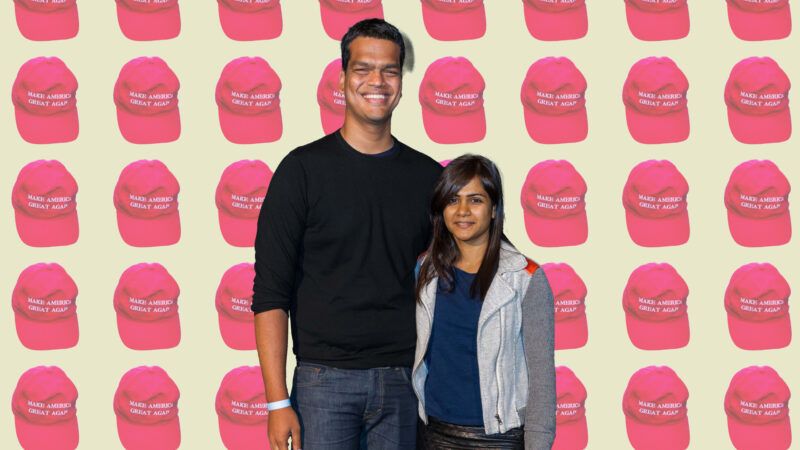Can Nativists and Dynamists Coexist Within Trump's MAGA Coalition?
An ongoing online debate over visas for highly skilled foreign workers is revealing a fissure that might define Trump's second term.

When President-elect Donald Trump tapped Sriram Krishnan to be a senior policy advisor on artificial intelligence, he inadvertently revealed one of the major fissures within the nationalist conservative coalition—and the fault lines will likely shape a good portion of his second term in office.
Krishnan is an Indian-American tech entrepreneur, venture capitalist, and business partner of Marc Andreessen, a key Trump ally with significant ties to Silicon Valley. As a wildly successful immigrant, Krishnan has advocated for streamlining America's overly bureaucratic green card system and eliminating the per-country caps on H-1B visas, which are available to specially skilled foreign workers. Most of the H-1B workers in the United States are Indians, but there would likely be even more if the arbitrary per-country caps were eliminated.
Those are ideas that make a lot of sense. Giving employers in the United States better access to the best and most skilled workers, regardless of where in the world they might currently live, is an easy way to ensure America keeps winning the global competition over technology. It would boost other industries too, and (as with all forms of immigration) would strengthen America's economy.
However, an online backlash against Krishnan's nomination reveals that a significant portion of Trump's political coalition doesn't care much about America winning that competition or ensuring a stronger economy. For them, Trump was elected to keep foreigners out—even if America suffers as a result.
That backlash got rolling on December 23, when Laura Loomer, the right-wing political activist who informally advised Trump's campaign, called Krishnan's appointment "deeply disturbing" in a post on X. Removing caps on H-1B visas would allow more foreign workers to come to the U.S. and "take jobs that should be given to American STEM students," she argued.
Complaints from Loomer and other nativists on social media drew responses from some of Trump's top allies, including Elon Musk and Vivek Ramaswamy—a pair of immigrants who made fortunes in tech and the co-chairs of Trump's Department of Government Efficiency.
"It comes down to this: do you want America to WIN or do you want America to LOSE," Musk wrote in one post, replying to another X user who made a Loomer-esque point about foreign workers taking jobs from Americans. "If you force the world's best talent to play for the other side, America will LOSE."
"The 'fixed pie' fallacy is at the heart of much wrong-headed economic thinking," Musk wrote in a separate response. "There is essentially infinite potential for job and company creation."
The debate has raged on X for days now, and has spun off in some weird and, at times, outright racist directions. It's turned into a fight that goes well beyond the merits of Krishnan's hiring or the policy implications of expanding H-1B visas. On Thursday, it took another strange turn when Ramaswamy posted a long screed blaming 90s television shows like Boy Meets World for creating a generation of lazy Americans—or something like that, because it's honestly somewhat unclear what his point was.
This is the sort of thing that happens on Twitter sometimes, particularly during slow news weeks. The specifics of the debate, at this point, are less interesting than its broad contours.
You might think of it as the nativists vs. the dynamists. That is, those who were attracted to Trump because he promised to build a wall and kick out foreigners vs. those who see Trump as uniquely positioned to tear down red tape and usher in a new era of American economic dominance. Both those groups believe they are the heart of the MAGA movement, but their agendas are pointed in almost diametrically opposite directions. Can both exist within a single presidential administration—even one led by as mercurial and vapid a character as Trump?
Loomer is mostly a troll and a crank, but she seems to understand the significance of this fissure within Trump's broader movement. "It was always inevitable that this fight would happen between big tech and MAGA," she wrote on December 26. "Let's just get it over with."
Libertarians, thankfully, don't have to pick a side in all this. But it should be clear that the country would be best served by Musk, Ramaswamy, Krishnan, and the other dynamists emerging victorious. Whatever their other failings—Musk's flirting with nasty ideology, Ramaswamy's bizarre nationalist rhetoric, etc.—they know that a successful country is a growing country, and their impulse to cut red tape for skilled immigrants is the right one. When Musk says the nativists are falling for the "fixed pie" fallacy, he's exactly right.
The alternative is ugly. If Trump governs the way the nativists want, it will deprive American businesses of talented workers, weaken the economy, and strengthen the hand of geopolitical opponents like China—which would be more than happy to welcome the tech talent America rejects. The nativists likely don't care that America would be worse off, because their goals are racial rather than economic, but theirs is the path to decline.
"The high-skill immigration debate has exposed a harsh truth," Alex Tabarrok, an economics professor at George Mason University wrote on X, summing up the ongoing debate. "A significant share of the Trump coalition isn't interested in ending the grievance Olympics—they want to win them."


Show Comments (90)